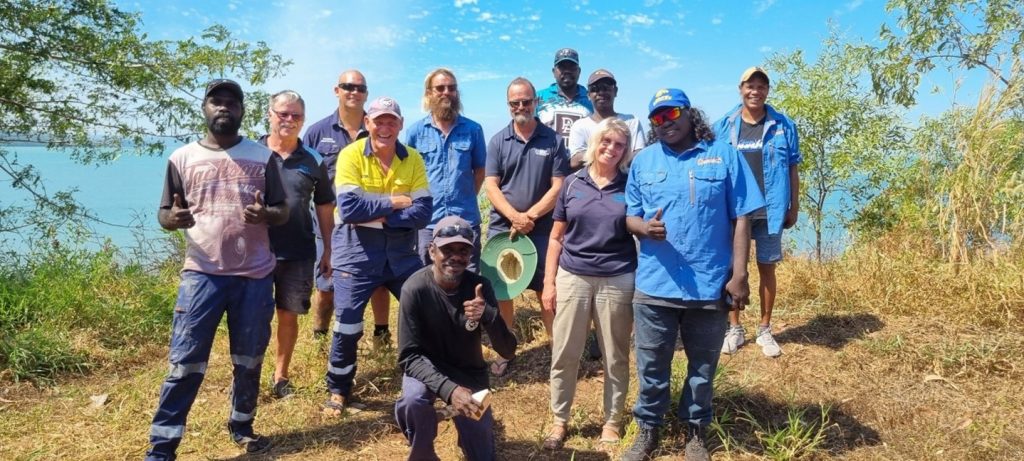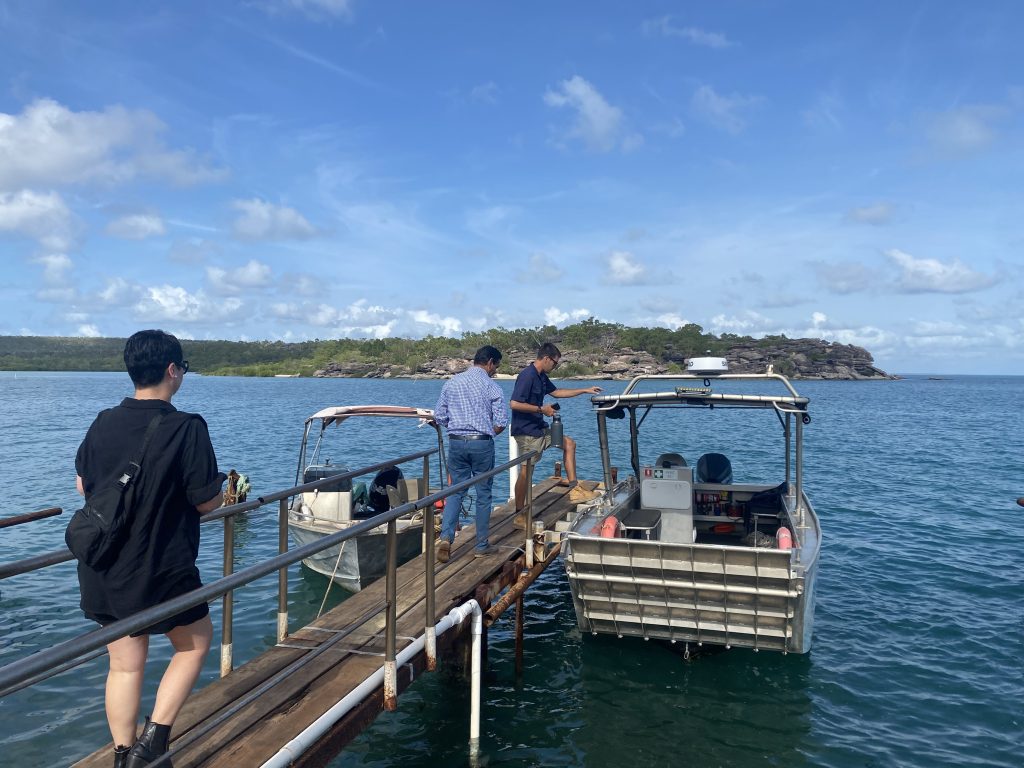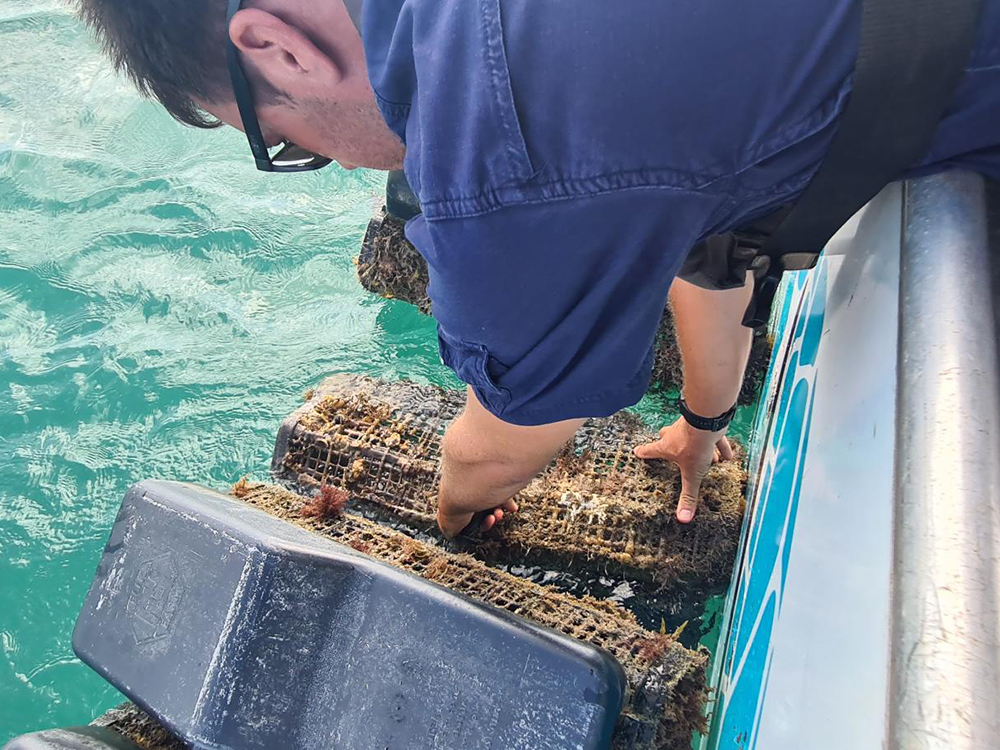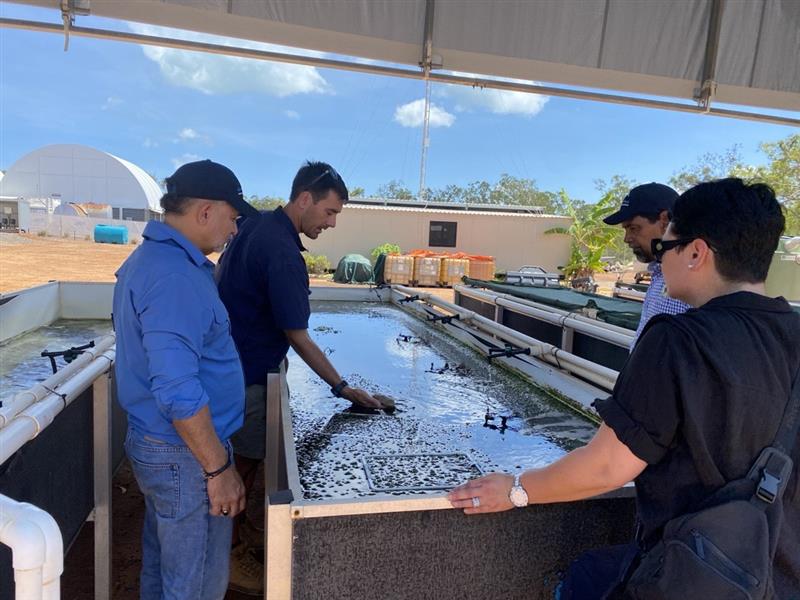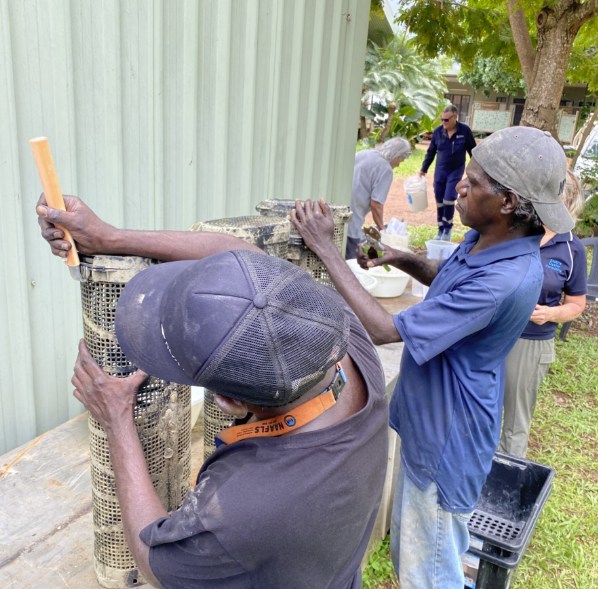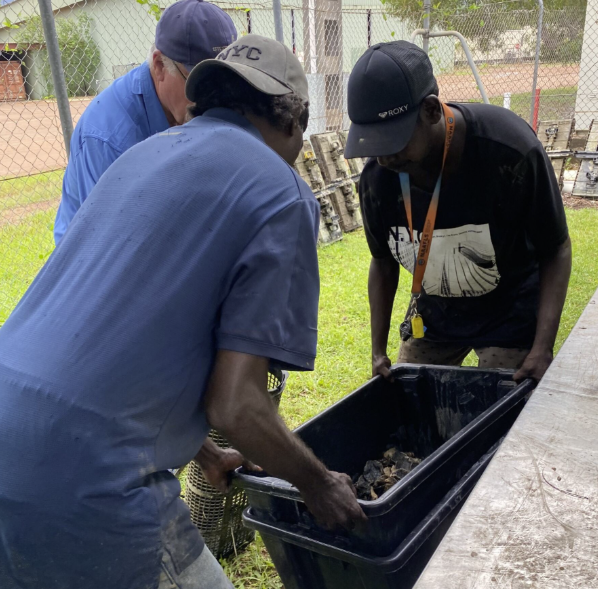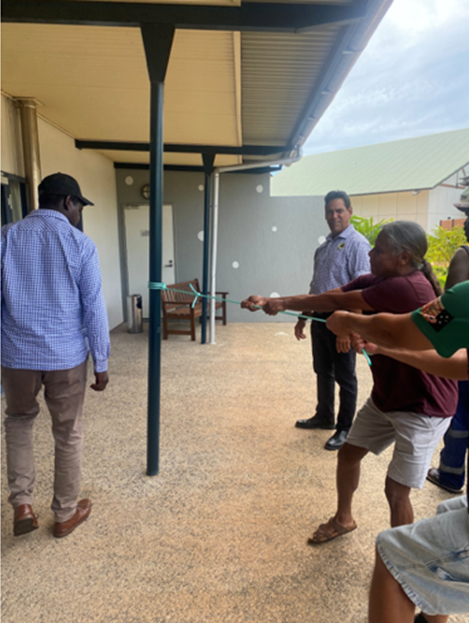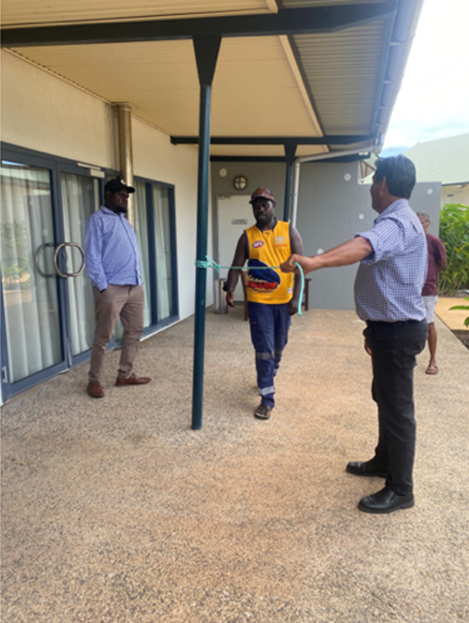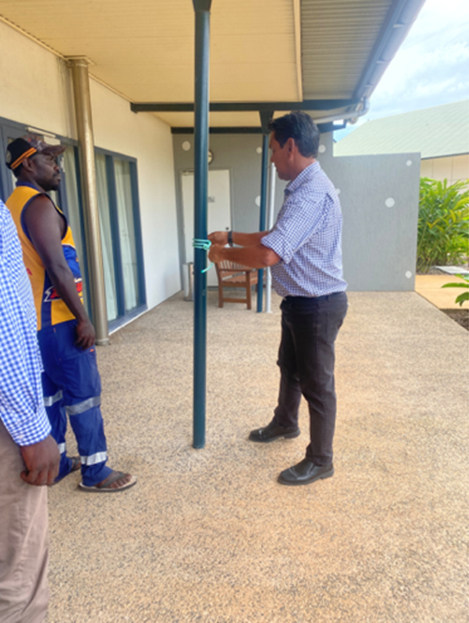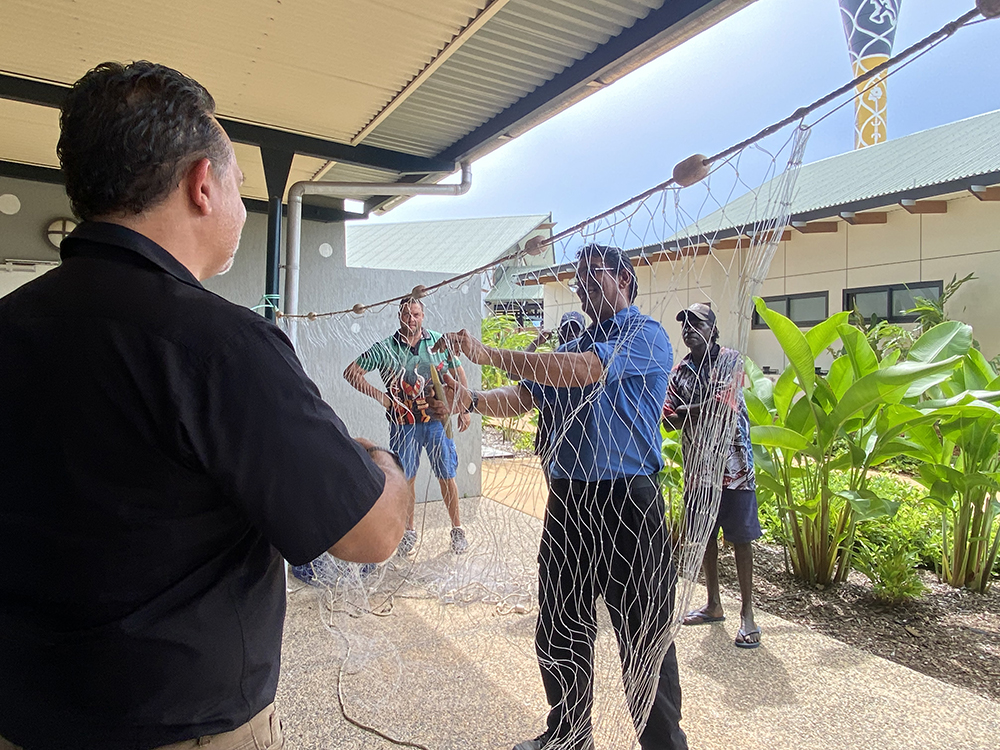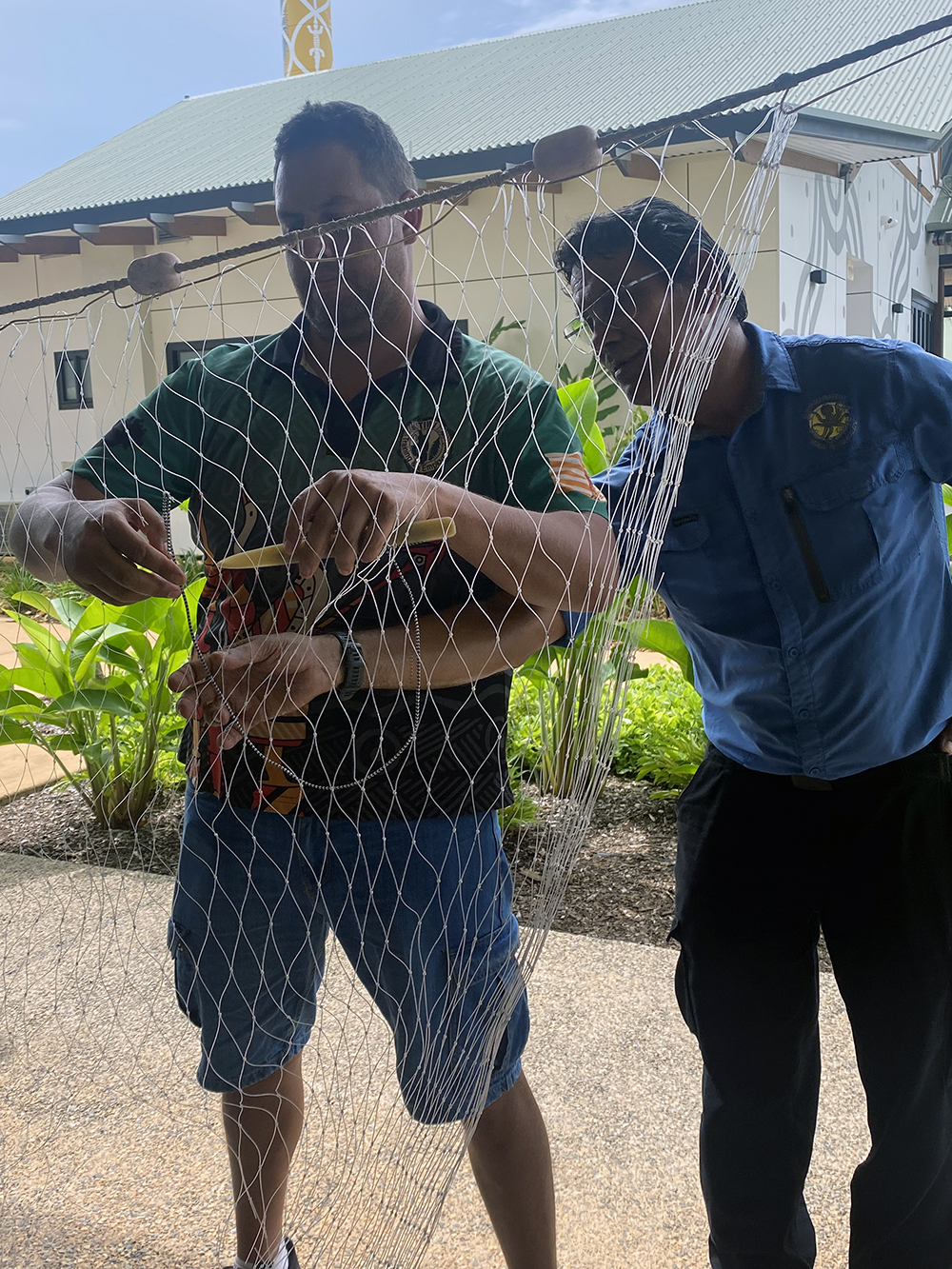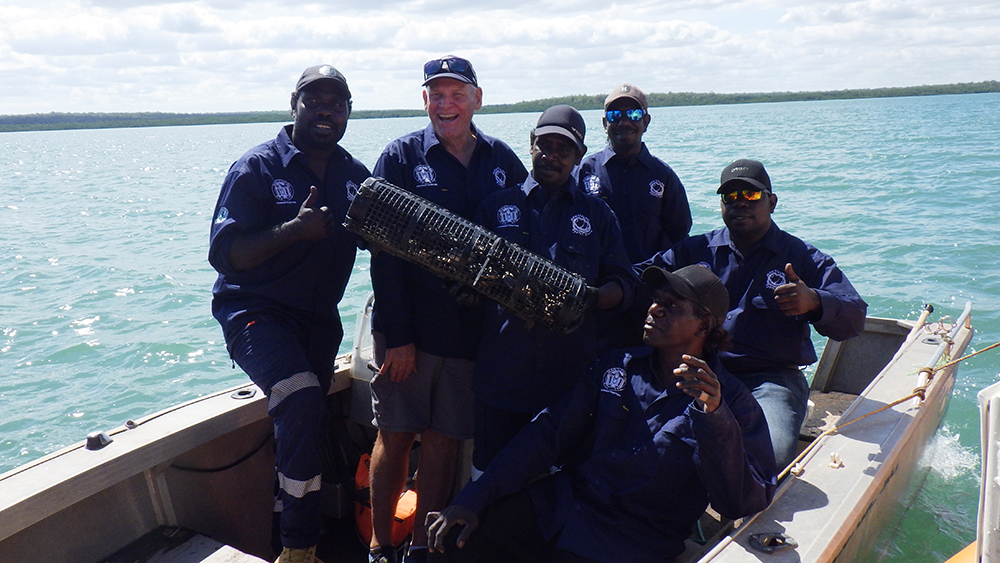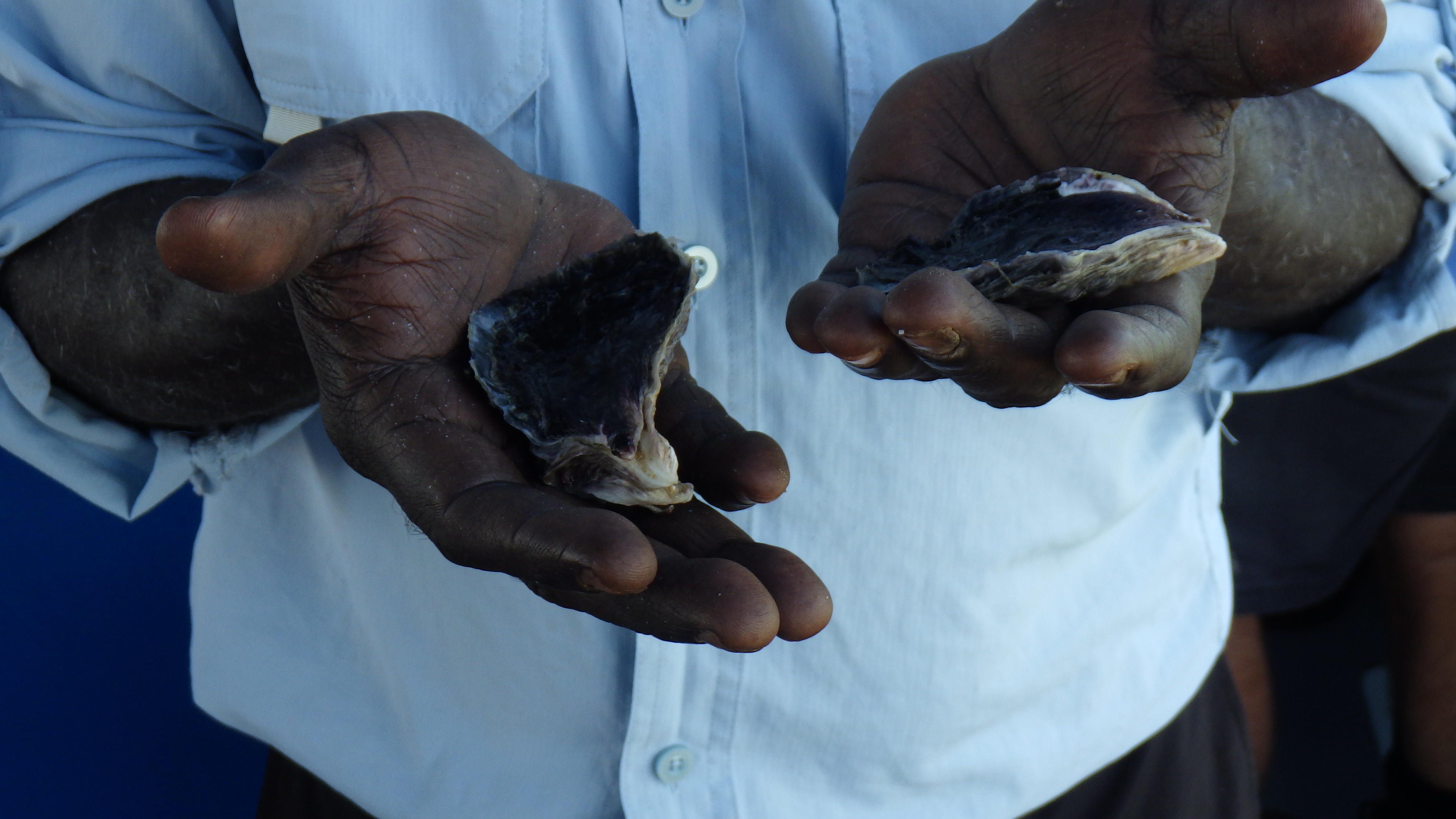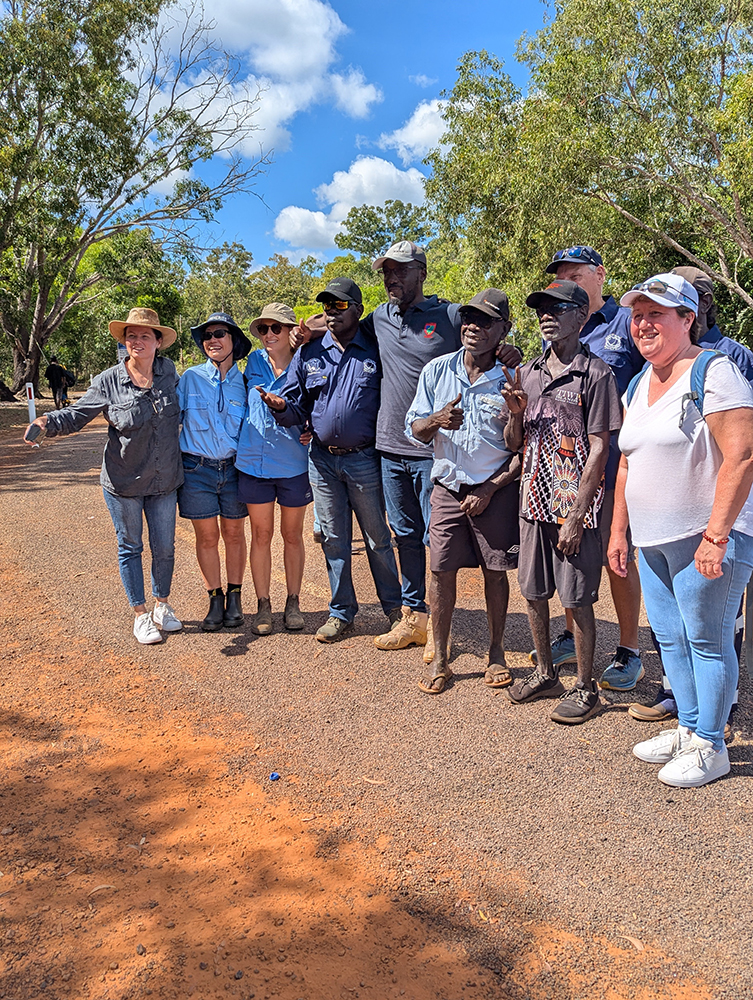To help support the growth of First Nations aquaculture enterprises, Aboriginal Sea Company and Skills Insight are working closely with Aboriginal and Torres Strait Islander communities to develop training tools that are culturally appropriate and tailored to the needs of First Nations learners. The training tools will support registered training organisations (RTOs) in delivering existing units of competency.
Click across the tabs to view active and completed project stages. Consultation takes place at every stage of the project.
Vision
To develop aquaculture training tools for RTOs through community led design and implementation.
Mission statement
Goals
In partnership with the Aboriginal Sea Company, First Nations communities and RTOs, this project aims to bring together vital cultural knowledge and skills needed to successfully operate a community-based aquaculture farm. By working together, we’re ensuring that the training reflects both traditional practices and modern techniques, empowering communities to thrive in the aquaculture industry.
Led by the Aboriginal Sea Company through community consultations, this initiative will empower communities to grow and thrive while staying connected to their cultural heritage. The Project Working Group is focused on creating training tools that truly reflect the unique needs of community-based aquaculture farming and are rooted in thousands of years of First Nations knowledge.
Culturally appropriate training and learning tools will enable Aboriginal and Torres Strait Islander people to receive training on Country. The resources created will provide clear pathways for training and employment within the aquaculture industry. By co-designing these resources, we’re helping communities to build essential skills, strengthen local capacity among trainers and workers, and supporting community-based aquaculture enterprises gain a stronger voice in the seafood industry.
Design
The voices and aspirations of Aboriginal and Torres Strait Islander people will be at the core of this project, guiding it in a way that promotes collaboration and meets the unique needs of community.
The Working Group is committed to engaging in open discussions about the specific training requirements for aquaculture farming within First Nations communities, so that the training and learning tools are designed in a way that is led by the community every step of the way.
The project aims to develop culturally appropriate vocational training tools that are aligned with existing units of competency in the national SFI Seafood Industry Training Package. These units of competency cover core skills and will integrate a crucial First Nations framework, essential for effective training delivery in this context. The project will be undertaken across two phases.
Phase one
Aboriginal and Torres Strait Islander corporations, community groups, businesses, industry groups, unions, land councils, registered training organisations, and individuals will come together to engage in meaningful discussions. These conversations will help us better understand community expectations and needs, so that the design of culturally appropriate training tools is informed by the people who know their communities best.
Phase two
Skills Insight and the Aboriginal Sea Company will continue collaborating with Aboriginal and Torres Strait Islander people and educational institutions in the development of culturally appropriate vocational training and learning tools, tailored to skill standards within the national SFI Seafood Industry Training Package.
Outcomes
The tools will be made available to First Nation communities, registered training organisations and other organisations that provide training in communities and on country.
The tools will also be able to be utilised in an informal training setting where necessary, with the potential for Recognition of Prior Learning to be undertaken at a later date. The tools will be housed on the Skills Insight website and available at no cost.
Project findings and outcomes, including training tools, will be documented in a final report that will be submitted to the Department of Employment and Workplace Relations.
Project team
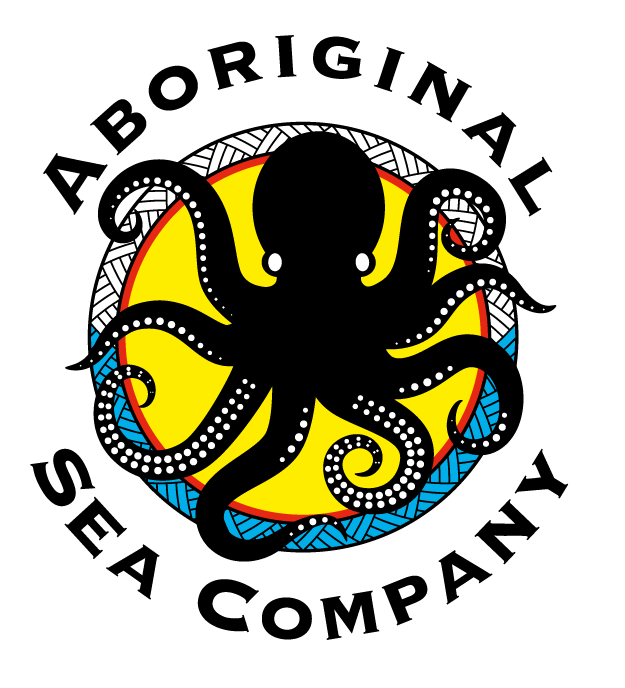
Aboriginal Sea Company
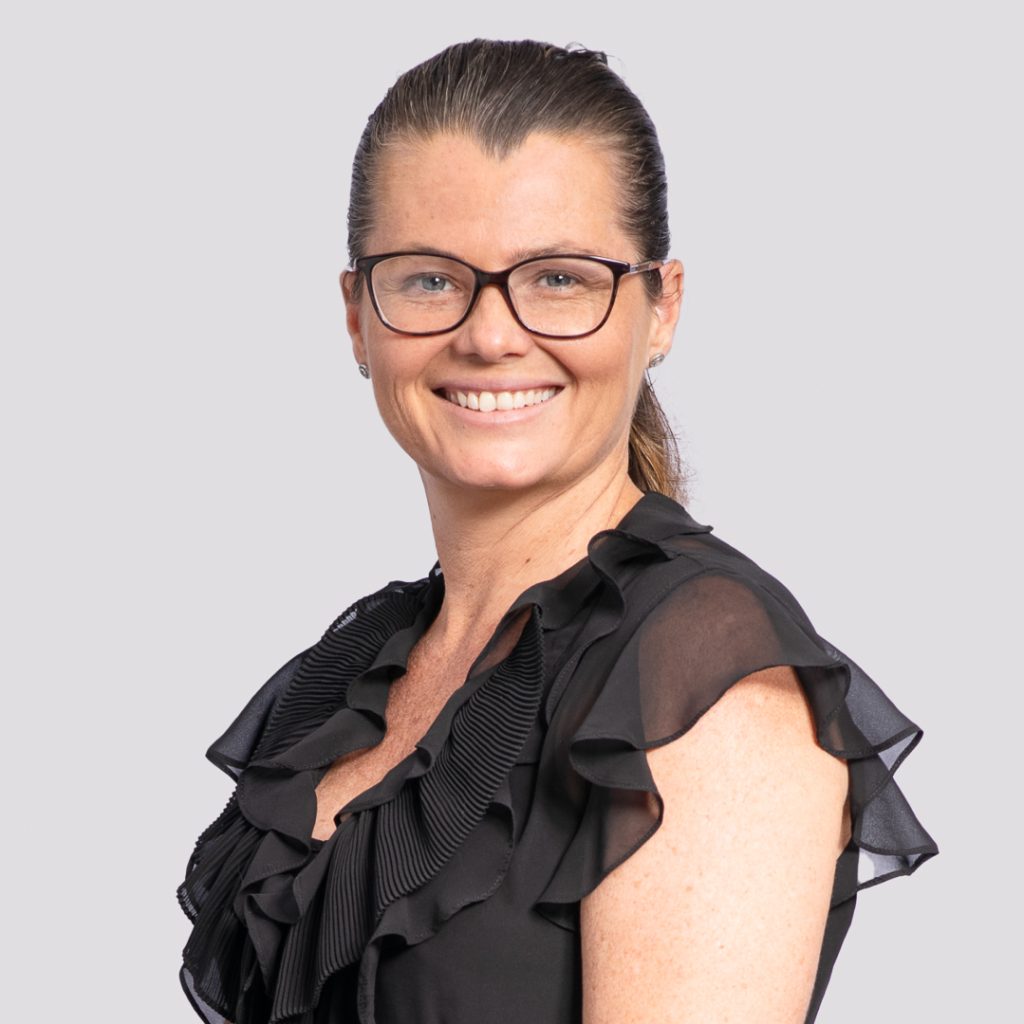
Debbie Knight
Stakeholder Engagement Manager
Skills insight
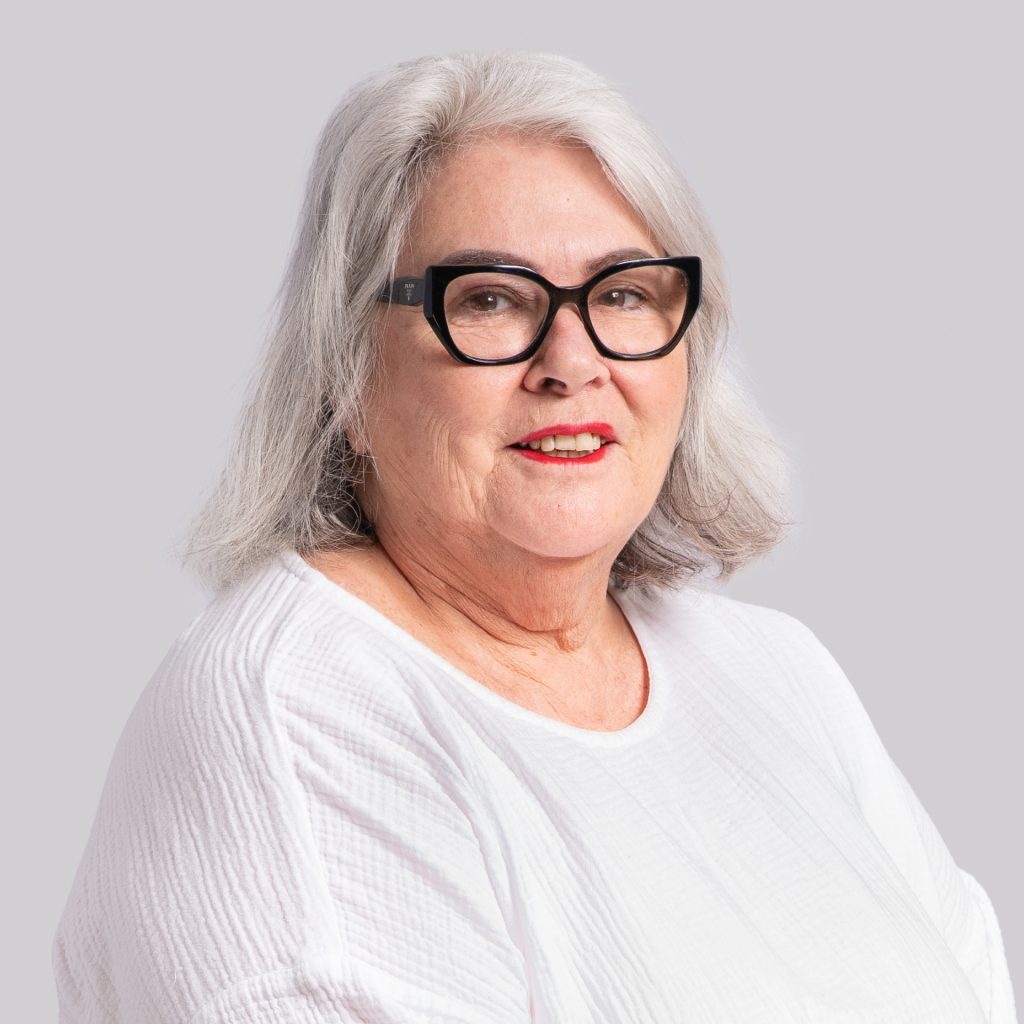
Cathy Beven
Training Materials Project Manager – Developer
Skills Insight
Timeline

A Project Working Group was established to inform the design of the training tools so that they are aligned with community expectations and needs. Following consultations with the Working Group and community, three draft training tools for working in aquaculture have been developed, covering:
In addition, the following supporting documents have been created:
The drafts are now being reviewed by community to provide input. If you are interested in providing input, please get in contact with Aboriginal Sea Company [email protected]
By ensuring training is delivered on our land and in a way that respects our culture, we’re not just teaching skills—we’re opening doors to real economic opportunities for our people. Culturally appropriate and accessible education empowers our communities, allowing us to build a future that’s grounded in both culture and progress.
Brian Tipungwuti, Aboriginal Sea Company Director and Warankuwu (Pandanus) man from the Tiwi Islands
Consultation and activities to date
Working Group Workshops →
The Aboriginal Sea Company facilitated Working Group discussions in January, May, June and August 2025. In attendance were representatives from the Aboriginal Sea Company, Groote Aqua Aboriginal Corporation, Mantiyupwi Aboriginal Corporation, Tiwi Islands Training and Employment Board, and Skills Insight.

Consultations with the Working Group emphasised the need for practical, community-centred and flexible training solutions that align with both business requirements and community expectations. In particular the group identified:
The Working Group also contributed to the early identification of relevant industry coverage, job roles and job tasks to support development of the training tools.
Insights from these conversations were documented in a report, which was submitted to the Department of Employment and Workplace Relations for review. If you would like a copy of the report, please request one by emailing [email protected]
At their August meeting, the Working Group provided feedback on drafts of the training tools and supporting documents, prior to Broad Consultation.
Community-led aquaculture farm visit →
The Aboriginal Sea Company, Groote Aqua Aboriginal Corporation, Skills Insight, and Traditional Owners from the region gathered on Anindilyakwa Country to deepen understanding of the work led by and for the community to develop a blue economy (i.e. a sustainable ocean economy). The Anindilyakwa people continue to make strides in aquaculture focusing on black lip oysters, trepang, and seaweed cultivation. These initiatives are guided by Traditional Owners’ cultural and social values, aiming to achieve both social and commercial impact. As part of their visit, stakeholder engagement managers Debbie Knight and Michelle Ingley-Smith from Skills Insight had the opportunity to visit an oyster farm to see the sustainable practices being used first-hand. Thank you to the Anindilyakwa people for their hospitality and contributions to this project.
Consultation with Tiwi Islands community →
The project team visited an oyster farm in the Tiwi Islands to learn about the job tasks and skills involved in grading oysters.
Rope tying demonstration activity →
The Aboriginal Sea Company led a rope-tying training session. The activity highlighted the effectiveness of video resources within their mentoring program and underscored the importance of face-to-face delivery and direct interaction with participants. Post demonstration, discussions explored the alignment of this activity with a vocational education and training unit of competency, a skill set and a qualification, reinforcing the importance of providing opportunities for repeated practice of skills.
Net demonstration activity →
The Aboriginal Sea Company sharing their net repair skills at the second Working Group workshop, just one of the job tasks identified as relevant to working within aquaculture and fishing.
Community-led aquaculture farm visit →
The Oyster Farm Field Day on 19 June, supported by the Cooperative Research Centre for Developing Northern Australia (CRCNA) and Agriculture Northern Territory, brought together Traditional Owners, members of the land council, Mantiyupwi oyster farmers, researchers and industry participants to celebrate the trial’s successes and shared commitment to establishing a commercial oyster industry led by Aboriginal communities.
This stage has not yet commenced.
At the finalisation stage, final checks are conducted and the outcomes of the project are submitted to the Department for consideration. Following this, outcomes are published or enacted.
Project background
In 2024, community members from Tiwi Island approached Skills Insight for assistance identifying Registered Training Organisations (RTOs) to collaborate on expanding the skills of First Nations people working in community-run aquaculture initiatives.
Consultations with RTOs around the country revealed significant gaps in the availability of culturally appropriate training tools. It also highlighted that RTOs require a fee-for-service arrangement to develop these tools and deliver training to First Nations communities, which creates a barrier.
As a result, Aboriginal Sea Company and Skills Insight are collaborating on this project to develop training tools for delivery of aquaculture training in First Nation’s communities, in consultation with relevant stakeholders.
